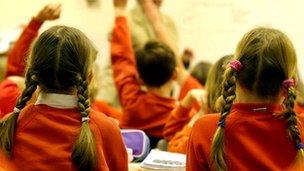Primary schools face tougher targets
- Published

Hundreds more primary schools in England could be labelled as underperforming as the government raises its test result targets.
Next year schools will need to have 65% of pupils achieving the expected levels in English and maths, up from 60%, Schools Minister David Laws says.
Mr Laws wants pupils to be "secondary ready" when they leave primary school.
Head teachers' leader Russell Hobby accused ministers of "shifting goal posts" to chase "easy headlines".
If schools continue to "consistently underperform" below this target they could be required to become academies.
Mary Bousted, head of the ATL teachers' union, described the change as "a cynical attempt to force even more schools into becoming academies".
Moving up to secondary
The increased target will apply to 11-year-olds taking their Sats tests in spring 2014.
Based on last year's results, there would have been 866 schools below the minimum target of 65%.
This would mean hundreds more schools being brought below the minimum level. There are 476 schools below the 60% threshold.
But a Department for Education spokesman says that past experience suggests results will improve when targets are set higher.
In the tests taken in spring 2012, the national average was 79% for pupils achieving the expected levels for English and maths.
The expected level in Sats test is Level 4 - but these levels are themselves set to be scrapped from 2016.
There will also be more pressure on the use of pupil premium, which is paid to schools to support disadvantaged pupils.
Schools which are deemed to be not doing enough to close the attainment gap between rich and poor pupils will have to produce action plans showing how they will spend pupil premium funding.
This will apply to schools which are below Ofsted's classification of "good".
"Many of our children are leaving primary school without having secured the basics in the 3Rs. They then go on to struggle at secondary school," said Mr Laws.
"We must ensure that a far higher proportion of pupils are 'secondary ready' by the end of their primary school. This will allow them not simply to cope, but thrive, when presented with the challenges and opportunities of secondary school."
'Root cause'
The plans have been criticised by head teachers.
Russell Hobby of the National Association of Head Teachers said there had been no time to see how pupil premium funding was working, so it was too early to start planning for further changes.
"England's primary schools have been improving steadily for many years, nearly doubling the rate of children leaving with the expected standards: there is no lack of ambition. The expected reward for that performance is always a shifting of the goal posts," said Mr Hobby.
He argued that working in partnership with the teaching profession has been "consistently sacrificed to achieve easy headlines".
Christine Blower of the National Union of Teachers said: "This move is more about forcing primary schools into academy conversion than it is about 'standards'.
"Primary schools have shown little interest in the government's academy programme. It is shocking that a government policy which has been roundly rejected for sound educational and practical reasons is being foisted on schools by which ever desperate means the government can think up."
Shadow education secretary Stephen Twigg said it was important to "address the root cause, not just how we measure standards".
"The government has cut back on catch up tuition programmes in English and maths, and thousands of teachers are leaving the profession.
"With the biggest cuts to education spending since the 1950s and the pupil premium merely plugging the gap in schools' budgets, too many pupils aren't getting the support they need."
- Published12 November 2012
- Published18 July 2011